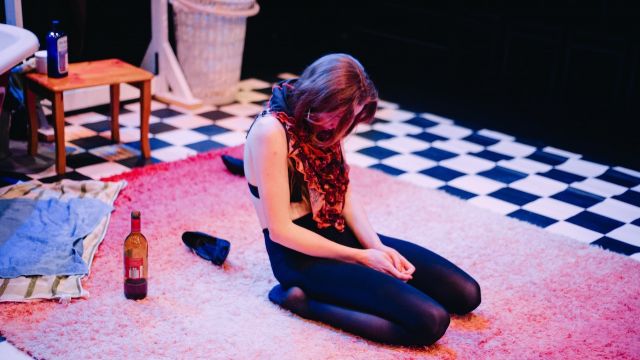Low Level Panic
Since its inception in 2021, HER Productions has become a small ‘tour de force’ on the theatre scene in Newcastle. Low Level Panic is their first venture onto the bigger Sydney stage. What better way to do so than with the team at bAKEHOUSE, whose business is “supporting independent theatre, diverse work and new and emerging artists.” And what better theatre to perform a play set in a bathroom than the intimate traverse stage of KXT on Broadway!
Though Clare McIntyre’s play premiered in London in 1988, the issues it raises are, unfortunately, just as valid today as they were then. Despite feminism, young women are still concerned with body image, identity and social expectations. Despite #Me Too, they still face sexual harassment and intimidation. Technology – iPhone cameras and social media in particular– haven’t helped!

So the messages of Low Level Panic still ring true, and this production finds the grit and humour of McIntyre’s play despite the fact that the writing in some of the scenes is laboured and less than economic in comparison with contemporary plays on similar topics. Nevertheless, the play acts as a ‘wake up’ for those who think society has changed.
Maike Strichow counters some of the long dialogue with direction that centres on developing the characters and their relationships – and effective use of the space in set designer Charlotte de Wit’s very 1980s share house bathroom, complete with hot pink wash basin and tub, in which de Wit herself spends the whole of the first scene, naked and covered in suds!

The character de Wit plays is Jo, who sounds ‘cool’ and self-assured, but dreams of losing weight, being more attractive … “I’ d feel brilliant about myself. I’d get really thin” … and drinking pink champagne supplied by wealthy men. De Wit finds the brittleness that Jo hides behind a ‘show’ of confidence that has been – and is – the mainstay of many women. Her Jo is the ‘fun’ member of the share house, the talkative, untidy one who ‘hogs’ the bathroom, but is lovable, and makes the others laugh with a bravado that almost conceals her vulnerability.
Marigold Pazar is Mary, the thinker of the three residents of the share house. Mary lives with the horrific memory of being raped on her way home from work. Pazar ‘relives’ that experience in a scene that is meticulously directed and chillingly performed. Pazar uses brief, pensive pauses as an effective contrast to de Wit’s pace as they depict the strengths and frailties that bond their characters.

Celia, played by Megan Kennedy, is the prim contrast to Jo’s untidiness and Mary’s introversion. Kennedy makes her prissy and prudish, fastidiously applying her creams and lotions and advising in the style of fashion magazines of the time: “You’re no good to anyone if you don’t like yourself. We’re none of us perfect. I don’t look like anything at all without make up.” Kennedy too uses pause effectively – and expressive looks and gestures that almost satirise the “Celias” that advertising created.
Strichow, her cast and production team – de Witt and lighting designer Lyndon Buckley – create a picture from l990 that demonstrates clearly to 2024 that, for many women, “the more things change, the more they stay the same”. Congratulations to HER productions for bringing their vision of McIntyre’s play – and the issues that still resonate so deeply with women – down the F1 to Sydney.
Carol Wimmer
Images by Georgia Jane Griffiths
Subscribe to our E-Newsletter, buy our latest print edition or find a Performing Arts book at Book Nook.

